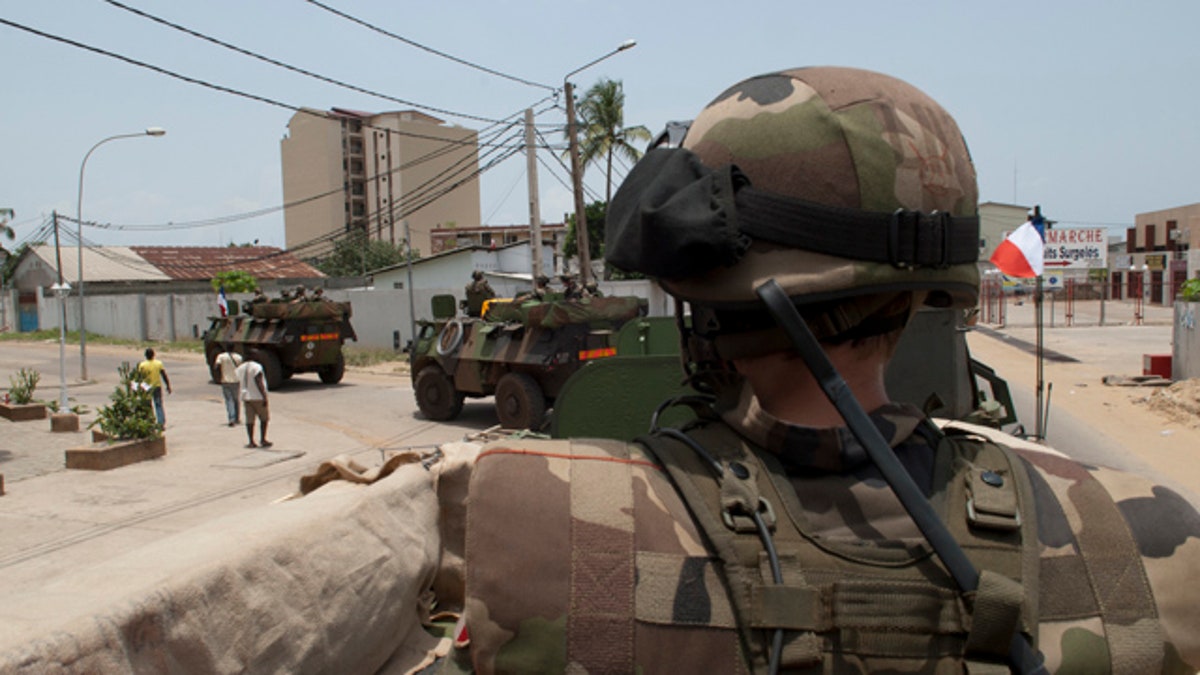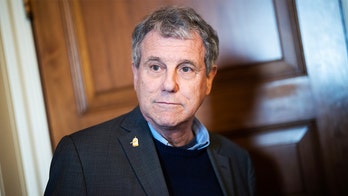
April 3, 2011: French soldiers patrol the Port Bouet district of Abidjan. President Obama has been criticized for paying little interest to the civil war gripping the Ivory Coast. (AP)
As civil war grips the West African nation of Ivory Coast, critics claim that President Obama is neglecting a potential crisis in Africa even as he wades into conflicts in the Middle East.
A former French colony, Ivory Coast had long been a model nation in a continent full of strife. But four months ago, after Allasane Ouattara was elected president and Laurent Gbagbo refused to step down, an on-going civil war type of conflict broke out. In the months since, the United States and allies have passed U.N. resolutions denouncing Gbagbo. Obama even taped a video message that was posted on the White House Web site.
But as fighting continues -- with reports of around 1,000 found dead over the weekend-- critics say the White House is neglecting the conflict and instead has focused on the Middle East.
“Rather than merely search yet again for short-term solutions in the violent aftermath of an election, it would be more sensible to look for ways to prevent future crises rooted in Africa’s dysfunctional political systems,” Jendayi Frazer, a former Bush administration Under Secretary of State for African Affairs, wrote in the International Herald Tribune.
While Frazer argues for an overall Africa policy, others say the lack of involvement is two-faced by the White House.
"This reveals the fact that the “Obama doctrine” as the president described it – wherein a humanitarian disaster occurs that that compels the United States morally to intervene -- is in reality nothing of the sort," Brett Schaeffer from the conservative Heritage Foundation told Fox News.
But a senior administration official tells Fox News that those who are criticizing the lack of U.S. involvement in Ivory Coast are overlooking the administration’s long-term involvement in Africa, particularly in the Ivory Coast.
“In the wake of Libya, some have asked why the international community is not helping in Cote d’Ivoire – but it is, and has been for years. There are 11,000 U.N. peacekeepers on the ground right now. The U.N. mission has been there for eight years, and has helped keep things from falling apart at an incredibly fragile moment,” the official told Fox News.
The White House also points to a number of efforts by the administration, starting last year, that were designed to push Gbagbo including a letter from Obama to Gbabgo as well as financial and international sanctions placed on Ivory Coast at the U.N.
However, the president has made clear that despite what some say is an “Obama doctrine” when it comes to military intervention on humanitarian grounds, he doesn’t believe the action taken in Libya can be applied in a cookie cutter approach and that every region of the world is different.
“We want governments that are responsive to their people. And so we'll use all our tools to try to accomplish that. But Libya was a unique situation where a limited military intervention that had a strong international mandate and strong international participation could make the difference, life or death difference for a lot of people. And in that situation, it made sense,” Obama said in an interview on NBC last Tuesday.
Richard Downie, of the Center for Strategic and International Studies, says making a correlation between Libya and a country like the Ivory Coast would be a mistake.
“The other difference between the Ivory Coast and Libya, as the president pointed out, there was an imminent threat (in Libya).
“A small opportunity for action in Benghazi with Qadaffi’s troops closing in,” Downie told Fox News. “In Cote d’Ivoire, and it’s a misfortune for them, this has been a slow-moving crisis where, there have been human rights abuses but you didn’t have this “one moment” where a terrible massacre occurred or there was an imminent threat to a town or city.”
The president has some history in wanting to be involved in Africa. During the 2008 campaign, he pressed, quite strongly, for U.S. intervention in the refugee crisis in Darfur and has since made Sudan a focus for his administration.
“The United States should support the immediate deployment of an effective international force to disarm militia, protect civilians and facilitate delivery of humanitarian assistance in Darfur… international pressure is required for the Sudan regime to accept an international peacekeeping force,” Obama said in 2008.
But since taking office, the White House has had a mainly hands-off policy on Africa - a policy not new to any White House - that tries to prompt Africa to handle its own affairs through the African Union and other organizations. Critics of that policy say it’s good in theory but doesn't necessarily work in practice.
"It's a crisis Africans should be dealing with, but they don’t have the capacity to deal with it," says Downie. "To expect African nations to put up a military force to go in and take out a former president is asking a lot – this would be a tricky situation for anyone."
But others are far harsher in their criticism.
"The United States has obviously determined this is not a priority and what that reveals is that while the administration may say grandly the U.S. has a moral reason to intervene when the rubber hits the road, that rhetoric is nothing more than that," says Schaeffer. But even Schaeffer isn’t clear on what the final outcome should be in Ivory Coast.
"I'm not sure the United States should have done something different but what it does show is there’s a disconnect between the administration's claimed doctrine and what its willing or capable of doing on the ground."
But despite substantial diplomatic efforts in the still war-torn Sudan, critics of the administration’s Africa policy claim that the White House has shifted its focus to the Middle East to the detriment of African issues. Administration officials said it was a matter of perception.
“It’s always tough to get the U.S. media to cover a civil war in Africa – and especially at a time when events in the Middle East are dominating the headlines – so most people have no way of knowing the amount of time and energy the Administration has been pouring into the effort to avert a humanitarian disaster in Cote d’Ivoire and get the democratically elected president in power with as little bloodshed as possible,” one senior administration official told Fox News. “It has been an international effort for sure, but with a ton of heavy lifting and leadership by the White House.”
In the meantime, as the fighting continues in the capital city, over the weekend, U.S. Ambassador to the U.N., Susan Rice, once again called for Gbagbo to step aside and for the crimes against humanity to stop.
"The United States condemns any and all abuses of human rights and demands that all parties halt attacks against innocent civilians and respect the fundamental human rights of the Ivorian people,” Rice said in a statement Sunday.




